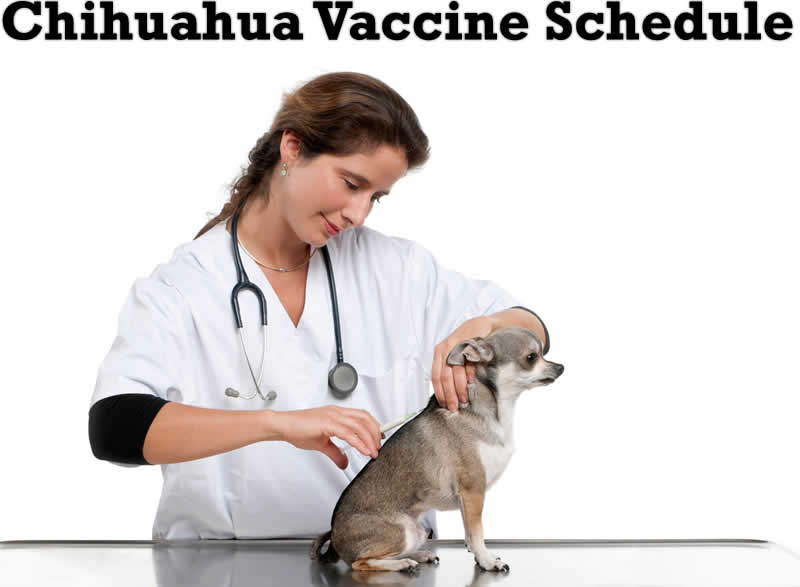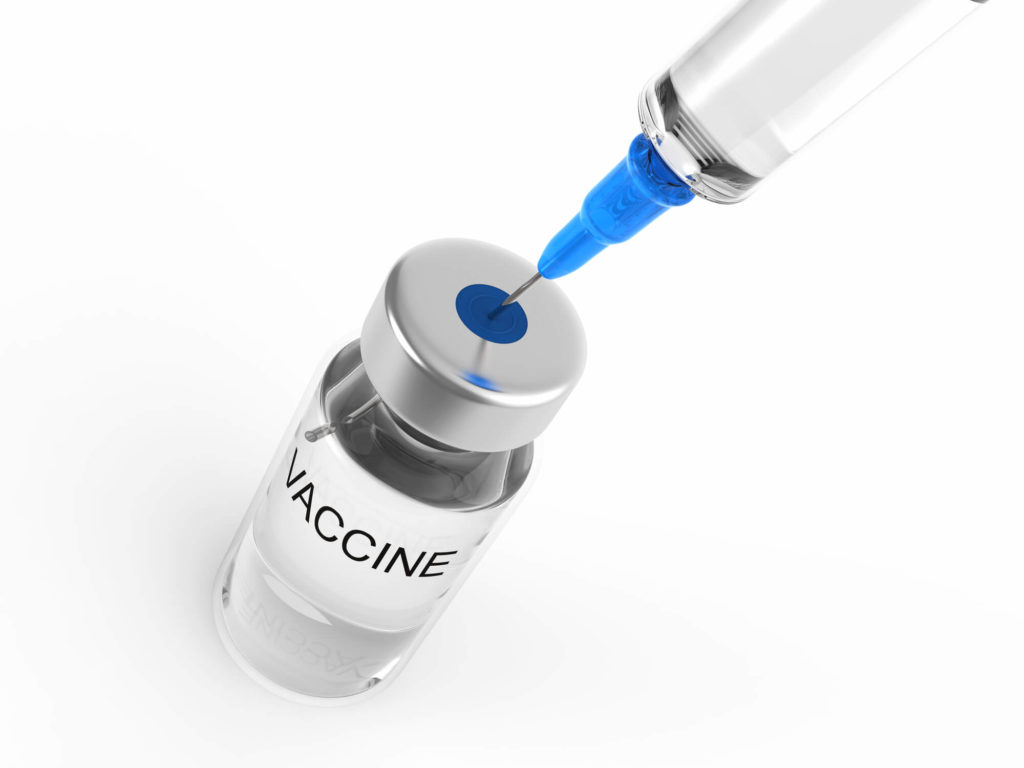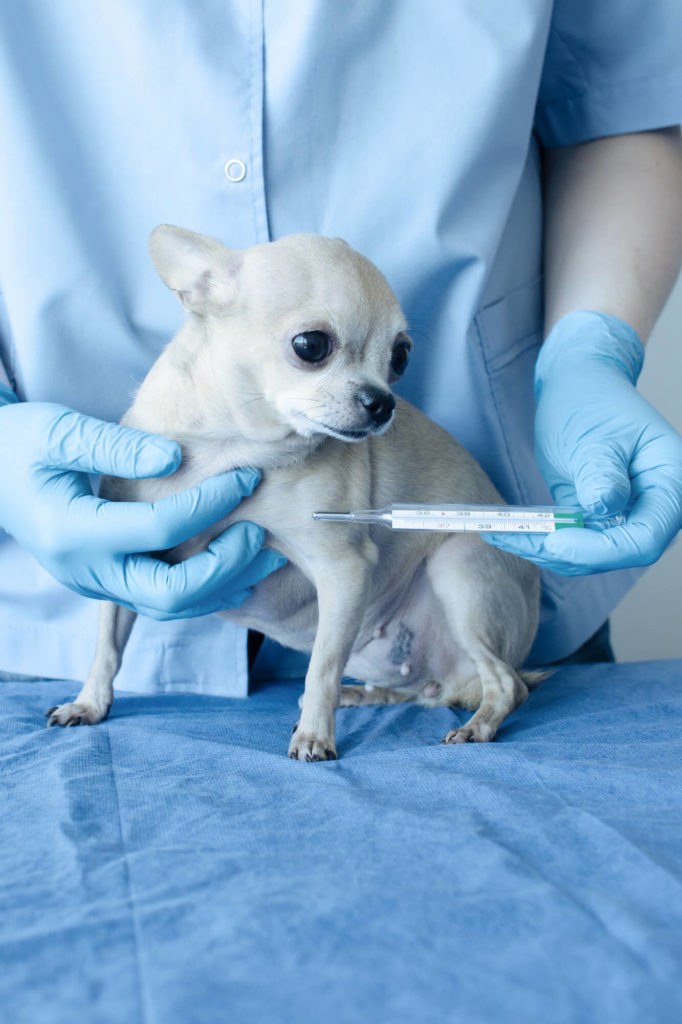
Vaccines greatly reduce the risk of many common and potentially fatal infectious diseases in Chihuahuas. Whether it’s a dog park, pet store, veterinary office, grooming salon, or even your own backyard, disease-causing germs are lurking everywhere. If your Chihuahua hasn’t been vaccinated or kept up to date on his vaccines, he could catch rabies, canine parvovirus, distemper, canine adenovirus, or other serious viral and bacterial infections.
Owners must know what vaccines their Chihuahua needs and when. If your Chihuahua has a low risk of infection for a “non-core” disease, vaccination isn’t necessary. Like pharmaceutical drugs, vaccines carry their own risk of adverse side effects (we’ll get to that later). Nonetheless, veterinarians agree that healthy dogs, particularly puppies, should be vaccinated for several common viral and bacterial diseases. Follow the schedule and advice below to keep your canine companion healthy and disease-free.
How Vaccines Work
While no vaccine is 100% effective, vaccination is the single most important form of preventative medicine for dogs. Once administered, it triggers a response by your Chihuahua’s immune system, reducing the risk of future infection from the viral and/or bacterial strains for which it was developed. Some vaccines protect against a single disease, while others protect against multiple diseases (known as a combination vaccine).
When scientists create vaccines, they kill or chemically alter the original pathogen so it no longer causes illness. This is a methodical process, as the virus or bacteria must still contain its original protein molecules (antigens) to trigger a response by the dog’s immune system. If the pathogen is too strong, the vaccine could cause the disease rather than prevent it. If it’s too weak, it won’t offer adequate protection.
Core vs Non-Core Vaccines
Canine vaccines fall under one of two categories: core and non-core. Core vaccines are generally recommended to all dogs because they are highly effective at preventing many common and potentially life-threatening viral and bacterial diseases.
Non-core vaccines are optional, depending on your Chihuahua’s risk of infection. Factors such as geographic location, overall health, contact with other animals, and expected travel to other regions will affect your Chihuahua’s risk of infection. If your Chihuahua has a high risk for a non-core disease, your veterinarian may recommend vaccination. If he has a low risk for a non-core disease, vaccination typically isn’t necessary.
In 2017, the American Animal Hospital Association (AAHA) revised its list of core and non-core canine vaccines. Core vaccines now consist of the following:
- Canine parvovirus
- Canine distemper virus
- Canine adenovirus type 2 (cross-protects against both adenovirus type 1 and type 2)
- Rabies
Non-core vaccines include the following:
- Leptospirosis
- Parainfluenza (kennel cough)
- Bordetella bronchiseptica (kennel cough)
- Lyme disease
- Canine Influenza Virus (CIV)
Why Puppies Need Multiple Vaccinations
Puppies are more susceptible to infectious diseases than adult dogs because their immune systems have not yet fully developed. When nursing, they receive disease-fighting antibodies from their mother’s milk. But this protection is only temporary, with the puppy’s immune system weakening as he transitions from milk to dog food. Vaccination offers protection during this sensitive time by significantly reducing the risk of common viral and bacterial infections.
While there’s no one-size-fits-all vaccine schedule, you can refer to the following chart for a typical Chihuahua’s vaccination needs.
Chihuahua Vaccine Schedule
| Chihuahua’s Age | Recommended Vaccine |
| 5 Weeks | Parvovirus |
| 6 Weeks | *Combination vaccine (parvovirus, distemper and adenovirus type 2).
Parainfluenza, bordetella bronchiseptica, for puppies at risk for kennel cough. |
| 9 Weeks | *Combination vaccine (parvovirus, distemper and adenovirus type 2). |
| 12 Weeks | *Combination vaccine (parvovirus, distemper and adenovirus type 2).
Rabies (administered by a licensed veterinarian; vaccination age requirements vary by state). Parainfluenza, bordetella bronchiseptica, for puppies at risk for kennel cough. Lyme disease, where Lyme disease is a concern or if traveling to a region in which it occurs. |
| 15 Weeks | *Combination vaccine (parvovirus, distemper and adenovirus type 2).
Parainfluenza, bordetella bronchiseptica, for puppies at risk for kennel cough. Lyme disease, where Lyme disease is a concern or if traveling to a region in which it occurs. |
| Adult **Booster Shots (Every 1 to 3 Years) |
*Combination vaccine (parvovirus, distemper and adenovirus type 2).
Parainfluenza and bordetella bronchiseptica, for dogs at risk for kennel cough. Lyme disease, where Lyme disease is a concern or if traveling to a region in which it occurs. Rabies (administered by a licensed veterinarian; re-vaccination requirements vary by state). |
| *Some combination vaccines may also protect against coronavirus and/or leptospirosis. See below for more information on these vaccines.
**According to the American Veterinary Medical Association (AVMA), dogs at low risk of exposure may not need annual booster shot vaccinations. The AAHA now recommends 3-year vaccines for core diseases, with the exception of rabies which is either a 1-year or 3-year vaccine depending on the state. |
|
Rabies Vaccines: It’s the Law
Most states legally require all domesticated dogs and cats (and sometimes ferrets) to be vaccinated for rabies. In New Mexico, for instance, owners must vaccinate all dogs and cats at 3 months for rabies, following up with a booster shot within 1 year of the first vaccination and subsequent boosters every 1 to 3 years, depending on the vaccine used. In Iowa, all dogs must be vaccinated for rabies at 6 months, with follow-up booster shots according to the Compendium of Animal Rabies Prevention and Control. You’ll also notice that many states require rabies vaccines to be administered by a licensed veterinarian, whereas other vaccines can be administered by the owner.
For a complete list of rabies vaccination laws by state, check out the AMVA’s rabies guide.
There’s a good reason for the legal requirements surrounding rabies vaccines. Spread through the saliva of an infected host, rabies is nearly 100% fatal in dogs and can also be transmitted to humans. Therefore, vaccination not only protects our canine companions; it also protects us from the virus.
What About Coronavirus and Leptospirosis Vaccines?

The AAHA Canine Vaccination Task Force no longer recommends the canine coronavirus vaccine, citing two specific reasons:
- The vaccine offers limited-to-no protection from the coronavirus.
- The coronavirus is a relatively mild disease, with many infected dogs showing no symptoms at all.
It’s also worth noting that only puppies under 6 weeks of age show symptoms of the coronavirus disease, meaning there’s no benefit in having an older dog vaccinated.
Owners should also think twice before having their Chihuahuas vaccinated for leptospirosis. Caused by the bacterial pathogen Leptospira, leptospirosis is transmitted to dogs (and people) by direct contact with contaminated urine, water or soil. It attacks the kidneys, causing inflammation and organ failure.
Current leptospirosis vaccines don’t protect against all 200+ versions of the pathogen. For the few versions that it does protect against, the vaccine has a 50 to 75% effectiveness rate for about one year. The World Small Animal Veterinary Association (WSAVA) even says it’s the least likely vaccine to provide adequate protection. Furthermore, toy breeds like the Chihuahua have the greatest risk of a severe reaction from the leptospirosis vaccine, including anaphylactic shock.
If you’re concerned about either the coronavirus or leptospirosis, talk with your veterinarian to discuss the effectiveness of vaccination and its associated risks.
Vaccine Risks and Side Effects: What Chihuahua Owners Should Know

While effective at reducing the risk of disease, vaccines don’t come without their own risks and side effects. Most of these side effects are mild, appearing within a few hours of vaccination and going away within 1 to 2 days. If your Chihuahua experiences any of the side effects listed below for longer than two days, contact your veterinarian.
Mild side effects include:
- Redness and swelling at the site of injection
- Mild fever
- Loss of appetite
- Low energy
- Runny nose
- Sneezing
- Local soreness
Mild side effects can typically be treated at home using the antihistamine diphenhydramine (Benedryl). Dosage varies depending on the Chihuahua’s weight, but a rule of thumb is to administer 1 mg diphenhydramine for every 1 pound of your dog’s body weight. If your Chihuahua weighs 6 pounds, give him 6 mg of diphenhydramine to relieve mild reactions.
There are also more severe side effects associated with vaccines, any of which should prompt immediate veterinary care.
Moderate-to-severe side effects include:
- Anaphylactic shock
- Persistent vomiting
- Persistent diarrhea
- Trouble breathing
- Seizures
- Hives
- Severe itching
- Swelling around the neck or face
Chihuahuas Have a High Risk of Reaction to Vaccines
According to a report by Chihuahua Club of America, Chihuahuas and other toy breeds — Pugs, Boston Terriers, Dachshunds and Miniature Pinschers — have a higher risk of adverse reaction to canine vaccines than medium and large breeds. After analyzing the vaccine records of 1.25 million dogs, epidemiologists at Purdue University found the risk of vaccine-associated adverse events (VAEE) decreased as a dog’s weight increased. George Moore, DVM, Ph.D., Director of Clinical Trials and Professor of Epidemiology at Purdue, explained by saying “Dogs weighing 22 to 99 pounds had about half the reaction risk as dogs weighing 22 pounds or less.”
Researchers also found that for every additional vaccine a dog received during the same visit, the risk of VAEE increased by 25%. This is another reason why owners should avoid combination vaccines containing leptospirosis and coronavirus, especially if their dog isn’t at risk for these diseases. A combination vaccine for the core diseases plus leptospirosis and coronavirus is 50% more likely to trigger an adverse reaction than a combination vaccine for only the core diseases, according to the study.
These findings were also reflected in the 2011 AAHA Vaccination Guidelines, which now recommends non-core vaccines be administered two or more weeks after core vaccines in toy breeds.
Titer Tests to Prevent Unnecessary Vaccination
Because the risk of adverse reaction is higher in toy breeds, many Chihuahua owners use titer tests as an alternative to mass vaccination. Titer tests don’t protect against infectious diseases. Rather, they reveal the strength of the dog’s natural immunity toward a specific viral or bacterial disease by measuring levels of antibodies in the blood. If your Chihuahua has a high titer count for leptospirosis, it’s unlikely he will catch the disease, even when exposed to the Leptospira pathogen. Therefore, vaccination for leptospirosis offers little-to-no benefit.
Titer tests are available for most common canine diseases, but they should not be used as a substitute for the rabies vaccine. Due to the disease’s high rate of mortality (100%) and legal implications, all Chihuahuas should receive the rabies vaccine as per state law.
References:
https://www.petcoach.co/article/how-vaccines-work/
https://healthtopics.vetmed.ucdavis.edu/health-topics/feline/vaccination-guidelines-dogs-and-cats
I three Chihuahua puppies,only one of them ways 1 kilo the other 2 way 800 grm, are they ready for vaccinations?
Hi..my name’s Elisa and I recently adopted a female Chihuahua puppy the person I bought her from said she was 10 weeks old and has not had any of her shots yet so I want to get her started on them immediately but I wanted to know if I should bring her in first just to make sure she’s as old as I was told which by now she should be like 12 weeks and just to make sure everything else looks good? And if I need to make an appointment what day and time is best for you? Also I was told that we can buy her immunization shots and give them to her here at home cause it saves me a lot of money and most of the shots are combined into 1 right? So it shouldn’t be too bad or by that I mean too much poking?? Lol Well I don’t want to go on and on so if you can plzz get back to me asap I’d really appreciate it…Thank u n I look forward to hearing from you
I have a 12 week old chihuahua. How often and what kind of vaccines should I start and for how long?
HE IS ONLY 3 POUNDS
Hi Chuck. I sit here now holding Baby. She is my wonderful 2 year old chihuahua. I am trying to remain as still as possible. When she moves she cry’s out in a painful way that breaks my heart! She was given combination vaccines yesterday. Became lethargic within an hour and now is hyperventilating refusing food and not much to drink. Her eyes Re glassy and of course the veterinary office is closed. I’m a Registered nurse and was wondering what meds I am gone her to help! She weighs 8 pounds…prednisone? Benadryl? Aspirin? She is the most loving dog ever and I can’t bear to see her in pain!!
Is she ok?
After getting their last shot from the dog rescue owner, both Chihuahuas were lethargic, non responsive, and weak. Is this a side effect? Also, we believe they were chewing on our white wood painted corners of the walls. Could it have been paint poisoning? They were sick at separate times and only one of them had a second episode??? How do I know
What all shots do I have to have for my 29 year old Chihuahua? I don’t know what all should I choose had he was my mother’s dog
WOW!! Is your Chihuahua really 29 years old? I hope my two live that long!!
We have a 10 yr old male chihuahua just under 11 pounds. He is in great health. We did not give him the Lepto vaccine last yr, because he had a bad reaction in 2017 when we did. In 2013 & 2014 he had a bad reaction, in 2015 & 2016 he did not. We are very concerned to do him more harm than good by getting the vaccine. What do others do? Thanks Chuck
I just adopted a female Chihuahua that the old owner says is around 10 years old. She had one litter and has been very random in heat. They say she has had no shots whatsoever. They say she has never been sick. What do you recommend as far as shots?